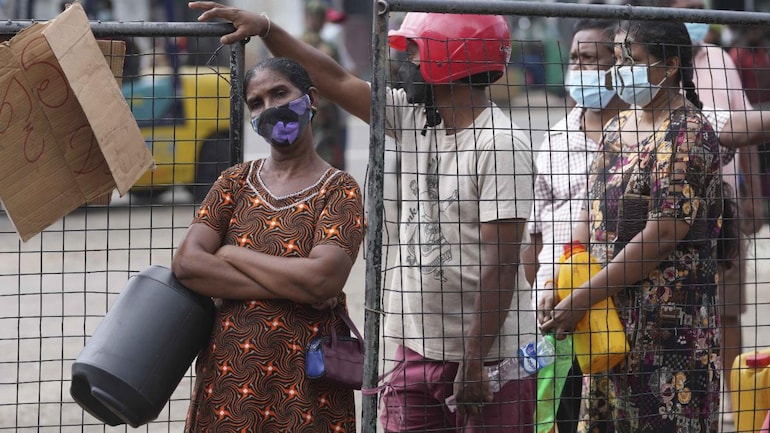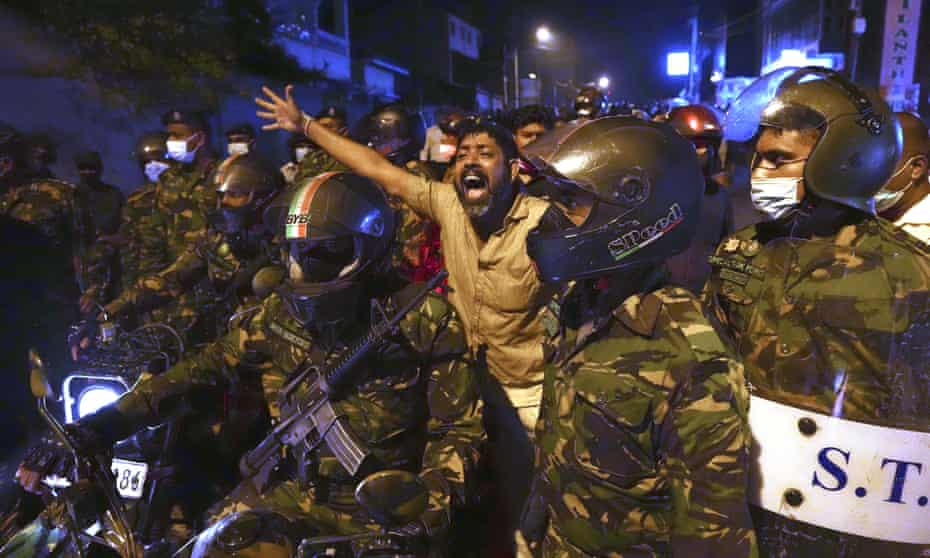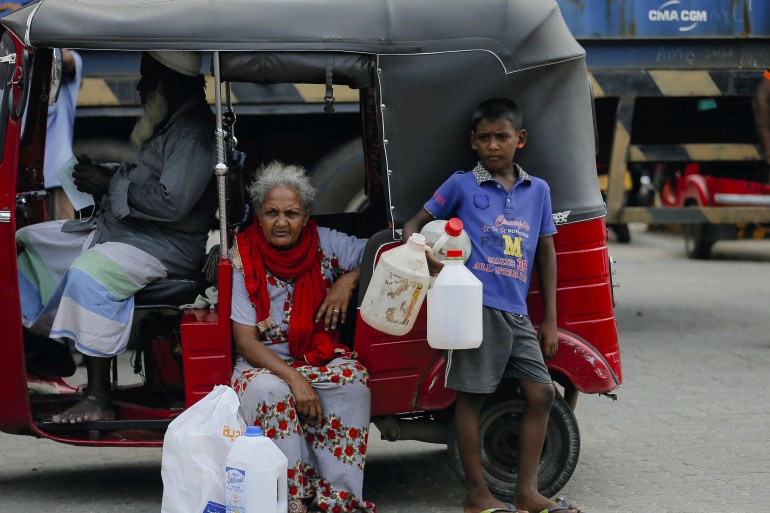UPDATED
Sri Lanka blocks social media sites amid protests against economic crisis
The country’s defence ministry has issued the order to ban the platforms.

The Sri Lankan government on Saturday blocked social media sites such as Facebook, WhatsApp and Twitter amid protests in response to a major economic crisis, the BBC reported.
Several mobile phone users received messages stating that WhatsApp was down “as directed by the Telecommunications Regulatory Commission”.
The commission stated that it restricted access to social media platforms in response to a request by the country’s defence ministry, according to Daily Mirror.
Several people in Sri Lanka said that social media platforms had been blocked, and that many people were accessing them through virtual private networks, or VPNs.
NetBlocks, a global internet watchdog that tracks shutdowns, also cited real-time network data to show that the country had restricted access to Facebook, WhatsApp, Twitter and Instagram, among other platforms, after midnight on April 3.
On Saturday, Sri Lanka declared a 36-hour nationwide curfew from Saturday 6 pm to Monday 6 am amid a series of protests over the island country’s worst economic meltdown since its independence. During the curfew, Sri Lankans are not allowed to step out of homes, except for essential services.
Earlier, some people on social media had urged people to take part in protests on Sunday.
On Friday, citizens had staged protests in Colombo as well as different parts of the country demanding President Gotabaya Rajapaksa’s resignation over the government’s handling of the country’s economic crisis.
Economic crisis in Sri Lanka
Sri Lanka is facing the economic crisis as its foreign reserves have hit rock bottom. The country had declared an economic emergency in August. Sri Lankans are now facing shortages of petrol, diesel, milk powder, cooking gas, kerosene and other essential items.
Authorities have imposed 13-hour daily power cuts from Thursday due to shortage of fuel. The state electricity regulator extended Wednesday’s 10-hour power cut by another three hours.
Government-run hospitals are running out of life-saving medicines due to a shortage of foreign exchange needed for imports. Several state-run hospitals have stopped conducting surgeries too.
On March 30, the Sri Lankan government imposed 10-hour daily power cuts across the country. Since the beginning of March, there had already been seven-hour power cuts in the island country. The duration was subsequently increased by three hours.
No gas, no medicine, no food: What life's like in crisis-hit Sri Lanka | Exclusive
Speaking to India Today, 69-year-old Thomos from Colombo said citizens are finding it difficult to get petrol, medicines and even food in crisis-hit Sri Lanka.
Ashutosh Mishra

Residents wait in long lines to buy kerosene oil in Colombo, Sri Lanka. (Photo: AP)
As the economic crisis in Sri Lanka spirals out of control, 69-year-old Thomos from Colombo told India Today that petrol is unavailable, medicines are difficult to find and essential food items are being sold at extremely high prices in the country.
"At the moment, we don't have any gas, petrol or kerosene oil. There are no medicines. I am 69 but this is the first time in my life that I have seen something like this happening," Thomos said.
He added, "We are not able to manage. There is no money and salaries. If we have money, there are no goods. When we go to some shops in Colombo, they say there's no dal, no rice, no bread. Or one pound of bread costs 100 Sri Lankan rupees. One cup of tea costs 100 Sri Lankan rupees. The prices of important things have gone up."
Further, long power cuts in Sri Lanka have affected the communication networks in the country.
ECONOMIC CRISIS IN SRI LANKA
With huge debt obligations and dwindling foreign reserves, Sri Lanka has found itself unable to pay for imports, leading to shortages of several goods including fuel.
Sri Lanka's economic woes are blamed on successive governments not diversifying exports and relying on traditional cash sources like tea, garments and tourism, and on a culture of consuming imported goods.
The Covid-19 pandemic dealt a heavy blow to Sri Lanka's economy, with the government estimating a loss of $14 billion in the last two years.
PROTESTS
To protest against the economic crisis, Sri Lankans have taken to the streets.
On Friday, angry protesters demonstrated near President Gotabaya Rajapaksa's home and demanded he resign. The protests turned violent - two army buses were stoned and one was set on fire. The police fired tear gas and a water cannon and arrested 54 people.
He declared a state of emergency in the island nation on Saturday.
Sri Lanka Declares Public Emergency After Inflation Protests
, Bloomberg News
(Bloomberg) -- President Gotabaya Rajapaksa declared a public emergency late on Friday after citizens protesting spiraling inflation and widespread power cuts clashed with police outside the Sri Lankan leader’s private residence.
The declaration gives Rajapaksa sweeping powers to suspend laws, detain people and seize property. The step was essential for the protection of public order and maintenance of supplies and services, he said in an extraordinary gazette.
The move comes after police fired tear gas and water cannons at hundreds of protesters who surged past barricades screaming “Go home Gota” near Rajapaksa’s home on Thursday, after data showed inflation accelerated to almost 19%, the highest in Asia. Sri Lankans subsequently took to social media to call people to gather in Colombo and surrounding areas on Sunday afternoon to peacefully protest against the economic crisis. The island nation is undergoing a severe shortage of food and fuel as it runs out of dollars to pay for imports.
Shock Waves From War in Ukraine Threaten to Swamp Sri Lanka (2)
Rajapaksa’s elder brother Mahinda serves as prime minister while Basil, the youngest, holds the finance portfolio. The eldest Rajapaksa brother Chamal controls the agriculture ministry while nephew Namal is the sports minister. These family members enjoy two-thirds majority support in parliament while the opposition remains divided. National elections will be held in 2023 at the earliest.
Sri Lanka, whose trade deficit doubled to $1.1 billion in December, had about $2.3 billion of foreign-exchange reserves in February and faces a $1 billion dollar bond repayment in July.
Rajapaksa’s administration in recent weeks has devalued the rupee, raised interest rates, placed curbs on non-essential imports, and reduced stock-trading hours to preserve electricity and foreign currency. He has also dropped resistance to seeking a bailout from the International Monetary Fund and is simultaneously in talks with nations including India and China for bilateral aid.
The IMF last month said Sri Lanka faces a “clear solvency problem” due to unsustainable debt levels, as well as persistent fiscal and balance-of-payments shortages.
©2022 Bloomberg L.P.
Sri Lanka president declares public
emergency after protests against economic
crisis
Declaration comes after hundreds of protesters clashed
with police and the military
Reuters
Sat 2 Apr 2022
Sri Lankan president Gotabaya Rajapaksa has declared a nationwide public emergency, following violent protests over the country’s worst economic crisis in decades.
Rajapaksa said in a government gazette notification late on Friday that he took the decision in the interests of public security, the protection of public order and the maintenance of supplies and essential services.
Hundreds of protesters clashed with police and military on Thursday outside Rajapaksa’s residence in a suburb of the capital, Colombo.
Police arrested 53 people and imposed a curfew in and around Colombo on Friday to contain sporadic protests that have broken out over shortages of essential items, including fuel and other goods.

Sri Lanka: 50 injured as protesters try to storm president’s house amid economic crisis
The Indian Ocean island nation of 22 million people faces rolling blackouts for up to 13 hours a day as the government scrambles to secure foreign exchange to pay for fuel imports.
The country’s lucrative tourism industry and foreign workers’ remittances have been sapped by the pandemic, and public finances were hit further by deep tax cuts promised by Rajapaksa during his 2019 election campaign.
Ordinary Sri Lankans are also dealing with shortages and soaring inflation, after the country steeply devalued its currency last month ahead of talks with the International Monetary Fund for a loan programme.
An alliance of 11 political parties has urged Rajapaksa to dissolve the cabinet and form a government with all parties to deal with the crisis, local media said, in a nation where both India and China are competing to build influence.
Police used teargas and water cannon to disperse crowds near Rajapaksa’s residence on Thursday, after they torched several police and army vehicles.
At least two dozen police personnel were injured in the clashes, an official said, declining to comment on the number of protesters hurt.
Tourism minister Prasanna Ranatunge warned such protests would harm economic prospects. “The main issue Sri Lanka is facing is a forex shortage, and protests of this nature will hurt tourism and have economic consequences,” Ranatunge said.
The United Nations representative in the country, Hanaa Singer-Hamdy, called for restraint from all groups involved in the clashes. “We are monitoring developments and are concerned by reports of violence,” she said on Twitter.

Published On 2 Apr 2022
Indian traders have started loading 40,000 tonnes of rice for prompt shipment to Sri Lanka in the first major food aid since Colombo secured a credit line from New Delhi, two officials told Reuters news agency on Saturday.
The Indian Ocean island nation of 22 million people is struggling to pay for essential imports after a 70 percent drop in foreign exchange reserves in two years led to a currency devaluation and efforts to seek help from global lenders.
The shipment of the staple comes before a key festival in Sri Lanka.
Fuel is in short supply, food prices are rocketing and protests have broken out as Sri Lanka’s government prepares for talks with the International Monetary Fund amid concerns over the country’s ability to pay back foreign debt.
India, the world’s biggest rice exporter, last month agreed to provide the $1bn credit line to help ease crippling shortages of essential items, including fuel, food and medicine.
The rice shipments could help Colombo bring down rice prices, which have doubled in a year, adding fuel to the unrest.
“Rice loading has started in southern ports,” said BV Krishna Rao, managing director of Pattabhi Agro Foods, which is supplying rice to Sri Lanka State Trading (General) Corp under the Indian Credit Facility Agreement.
“We are first loading containers for prompt shipments and vessel loading will start in a few days.”
Sri Lankan President Gotabaya Rajapaksa declared a nationwide public emergency late on Friday following violent protests over the country’s worst economic crisis in decades.
SOURCE: REUTERS
SRI LANKA: Asian Human Rights Commission Writes To The UN Secretary-General About The Situation In Sri Lanka
Mr. António Guterres
Secretary General of the United Nations
Office of the Spokesman for the Secretary-General
United Nations, S-233
New York
NY 10017
USA
A letter to inform about the possible catastrophic economic and social crises emerging in Sri Lanka and to seek the intervention of your office to bring about a solution to avoid the country falling into anarchy.
The Asian Human Rights Commission (AHRC) is a regional human rights organization associated with the UN human rights mechanisms for over 40 years and one which has worked very closely for the protection and promotion of human rights in Sri Lanka for the same period of time, we have the spirit and obligation to inform you and the relevant UN agencies about the rapidly developing, extremely critical situation, which if unaddressed, could lead to a serious collapse of the State and also the development of anarchy within the society at large.
As your good office will already know, Sri Lanka is now faced with the payment of debt related crisis may be the worst that it has ever experienced in its entire history. Many economists, bankers and people involved in businesses and enterprises as well as social organizations such as trade unions and other organizations associated with farmers and also all civil society organizations have been expressing their deepest fears about the developing situation in the country. As we write this, almost every day, massive demonstrations are taking place in Colombo, as well as in all other areas in the country, demanding an early solution to some of the pressing problems such as the problem of ever-increasing prices of essential goods, and the cutting down of the availability of power supplies, gas and almost every other basic essential of life. The acuteness of the problem could be reflected in the fact that the exams which were due to be held for school children were recently cancelled due to the inability of the authorities to provide papers for the students to write on during the exam. In every area of life, there is the reflection of a breakdown as the Government is unable to pay the prices for imports due to the scarcity of United States Dollars. All the predictions are that this crisis is going to continue unless there is some genuine and credible intervention to get support from the international community, including the International Monetary Fund (IMF) and other agencies, for the rescheduling of the payment of debts and at the same time, working out an extensive plan for bringing back stability to the country and to ensure a non-recurrence of the situation which caused this problem in the first place.
The present crisis comes as a result of a considerable period of neglect of the principles of good governance, as the result of which, the overview and supervision of financial institutions have also suffered very severely. In fact, the entirety of the State bureaucracy has been brought into an unprecedented crisis over several decades due to the centralization of power in the Presidential system, as the result of which, much of the governance related bureaucracy has been disempowered. Direct deregulation of almost every area of life has made it difficult to conduct any kind of rational management of the society. Among other things, this has also affected the administration of justice, the institutions of policing, prosecutorial institutions as well as the Judiciary itself. It is indeed a crisis of such magnitude already. The question that is commonly discussed by the Government, as well as the Opposition parties and also economists, all intellectual layers of society, as well as ordinary people is: what is the way out of this terrible debt trap?
Discussions are now focused on the way to seek the assistance of the IMF and also possibly other international agencies. However, the major problem that is thwarting the move towards this goal is the complete breakdown of the people’s faith in the political system as a whole. And this too is not just the product of a single act but is the result of a process that has developed over a long period of time. This loss of credibility in the political establishment as a whole has created a distrust on the one hand between the Government and all the Opposition parties, and on the other hand, the political establishment and the people as a whole.
It is at this juncture that an intervention by your Office and other UN agencies would help, for by playing a mediating role you could assist Sri Lanka to develop short-term and long-term plans for the recovery of the stability of the country and also to prevent the country falling into a situation of anarchy. If this opportunity is lost, what might happen in the immediate future is difficult to project.
A huge amount of information made available by many persons including persons who have played key roles in the past in the Central Bank of Sri Lanka, as well as in other financial institutions and the State bureaucracy and many others in the media and civil society are freely available now for anyone who would undertake a serious study into this tragic situation now faced by Sri Lanka. Under these circumstances, we urge you as the Head of the UN, which has played many good roles on behalf of Sri Lanka over a long period, to negotiate with the Sri Lankan Government as well as the Opposition parties and others to work out a sustainable plan to overcome this present situation and to ensure stability for this country.
As an important country situated in the Indian Ocean from the point of view of geopolitics, instability in Sri Lanka is also a matter of concern in international politics which gives further reasons as to justify a proactive role that could be played by the UN under these circumstances.
The AHRC is a nonpartisan organization not affiliated to any political body and has no other agenda except the protection and promotion of the rights of the people.
Thank you
Yours sincerely
Basil Fernando
Director for Policy and Programmes
Asian Human Rights Commission, Hong Kong























